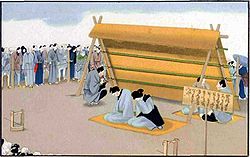Adultery: Difference between revisions
| [pending revision] | [pending revision] |
→Judaism: - No source cited and probably wrong |
moved anonymous comment up, and added cleanup template |
||
| Line 30: | Line 30: | ||
===Pakistan=== |
===Pakistan=== |
||
{{cleanup-date|August 2006}} |
|||
In [[Pakistan]] a law called [[Hudood Ordinance]] is in place that has caused a lot of misery to women because of the misuse by certain religious and political people and harsh methods used. |
In [[Pakistan]] a law called [[Hudood Ordinance]] is in place that has caused a lot of misery to women because of the misuse by certain religious and political people and harsh methods used. |
||
| ⚫ | |||
| ⚫ | |||
==See also== |
==See also== |
||
| Line 42: | Line 44: | ||
* [[Zina (sex)|Zina]] |
* [[Zina (sex)|Zina]] |
||
<!-- Wikipedia is not a collection of links --> |
<!-- Wikipedia is not a collection of links --> |
||
| ⚫ | |||
| ⚫ | |||
==References== |
==References== |
||
Revision as of 01:35, 10 August 2006
| Family law |
|---|
| Family |

Adultery is generally defined as consensual sexual intercourse by a married person with someone other than his or her lawful spouse. In many jurisdictions, an unmarried person who is sexually involved with a married person is also considered an adulterer. The common synonym for adultery is infidelity as well as unfaithfulness or in colloquial speech, cheating. It was also known in earlier times by the legalistic term "alienation of affection".[1]
The sexual partner of a person committing adultery is often referred to in legal documents (especially divorce proceedings) as a co-respondent, while the person whose spouse has been unfaithful is often labeled a cuckold; originally, the latter term was applied only to males, but in more recent times women have been characterized in this way too.
A marriage in which both spouses agree that it is acceptable to have sexual relationships with other people is termed open marriage and the resulting sexual relationships, though still adulterous, are not treated as such by the spouses.
There have been other varieties of adultery; in Hawaii before the arrival of Christians, twenty-three different kinds were recognized [citation needed].
Penalties for adultery
Historically adultery has been subject to severe sanctions including the death penalty and has been grounds for divorce under fault-based divorce laws. In some places the method for punishing adultery is stoning to death.[2]
In the original Napoleonic Code, a man could ask to be divorced from his wife if she committed adultery, but the adultery of the husband was not a sufficient motive unless he had kept his concubine in the family home.
In many jurisdictions (e.g, Austria, Korea, Taiwan), adultery is still illegal. In the United States, laws vary from state to state. For example, in Pennsylvania, adultery is technically punishable by 2 years of imprisonment or 18 months of treatment for insanity (for history, see Hamowy). That being said, such statutes are typically considered blue laws, and are rarely, if ever, enforced. In the U.S. Military, adultery is a court-martialable offense only if it was "to the prejudice of good order and discipline" or "of a nature to bring discredit upon the armed forces" [3]. This has been applied to cases where both partners were members of the military (and particularly where one is in command of the other), or one partner and the other's spouse. The enforceability of criminal sanctions for adultery is very questionable in light of Supreme Court decisions since 1965 relating to privacy and sexual intimacy, and particularly in light of Lawrence v. Texas, which apparently recognized a broad constitutional right of sexual intimacy for consenting adults.
In Canadian law, adultery is defined under the Divorce Act. Though the written definition sets it as extramarital relations with someone of the opposite sex, the recent change in the definition of marriage gave grounds for a British Columbia judge to strike that definition down. In a 2005 case of a woman filing for divorce, her husband had cheated on her with another man, which the judge felt was equal reasoning to dissolve the union.
Adultery in selected cultures
Judaism
In Old Testament Judaism, adultery was forbidden in the seventh commandment of the Ten Commandments, but this did not apply to a married man having relations with an unmarried woman. Only a married woman engaging in sexual intercourse with another man counted as adultery, in which case both the woman and the man were considered guilty [4].
In halakha (Jewish Law) the penalty for adultery is stoning for both the man and the woman, but this is only enacted when there are two independent witnesses who warned the sinners prior to the crime being done. Hence this is rarely carried out, but a man is not allowed to continue living with a wife who cheated on him, and is obliged to give her a get or bill of divorce written by a Sofer or scribe.
Pakistan
You must add a |reason= parameter to this Cleanup template – replace it with {{Cleanup|August 2006|reason=<Fill reason here>}}, or remove the Cleanup template.
In Pakistan a law called Hudood Ordinance is in place that has caused a lot of misery to women because of the misuse by certain religious and political people and harsh methods used.
Sindh(Pakistan)
In all Province specially in Sindh if they were caught or suspected for Adultery there is Death plenty for both but specially for female and they named it (Karo Kari)honorary killing.
